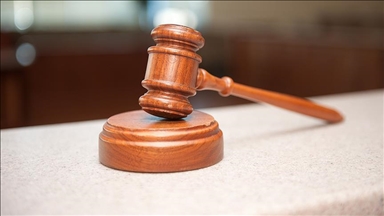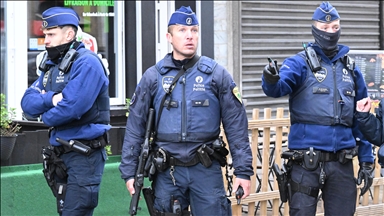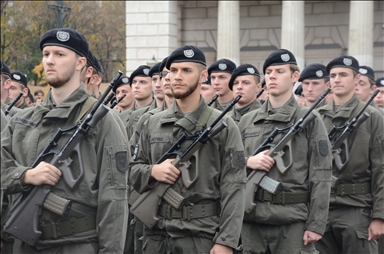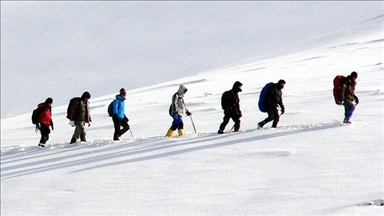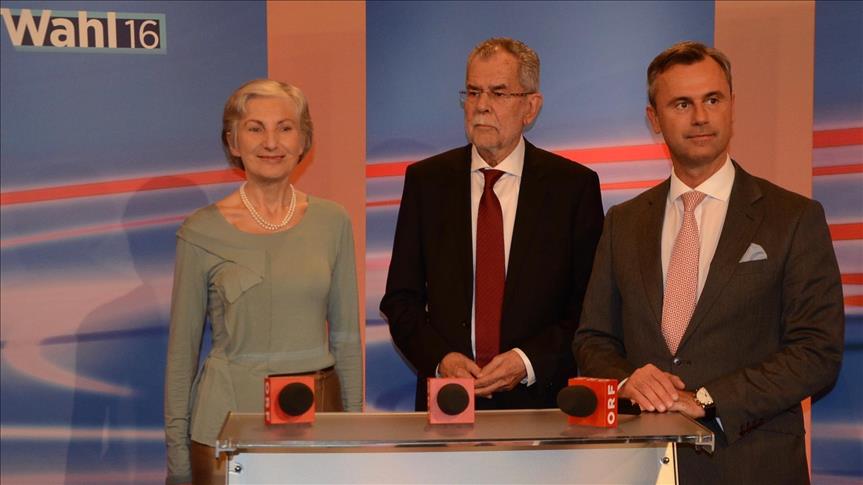 Presidential candidate of the Freedom Party (FPOe) Norbert Hofer (R), Presidential candidate of Green Party, Alexander Van der Bellen (C) and Former President of the court of cassation Irmgard Griss (L) attend a TV programme at Governmental TV channel ORF in Vienna, Austria on April 24, 2016.
( Hasan Tosun - Anadolu Agency )
Presidential candidate of the Freedom Party (FPOe) Norbert Hofer (R), Presidential candidate of Green Party, Alexander Van der Bellen (C) and Former President of the court of cassation Irmgard Griss (L) attend a TV programme at Governmental TV channel ORF in Vienna, Austria on April 24, 2016.
( Hasan Tosun - Anadolu Agency )
Ankara
By Hasan Tosun
VIENNA
The victory of a far-right candidate in Sunday’s first round of presidential election in Austria has put the "right-left struggle" back in the spotlight.
The win follows the rise of far-right movements in other European countries, including Poland, Slovakia, Hungary, France and Germany.
While far-right supporters across Europe think that these victories have strengthened the "patriotic front", social democrats are calling on all anti-fascists to keep the rightists away from power.
The victory in Austria is considered a "great success" since it is the first time a far-right candidate got the highest number of votes in a presidential election in the country’s history since 1945.
According to results of Sunday’s first-round vote, Freedom Party candidate Norbert Hofer got 36.4 percent of votes, whereas Green Party candidate Alexander Van der Bellen garnered 20.4 percent. The independent candidate Irmgard Griss got 18.5 percent votes.
Hofer and Bellen will face off in the second round on May 22.
Why did people vote for a far-right party?
The main reason behind Hofer’s victory is regarded as public discontent and lack of trust in the current coalition government, which is formed by two centrist parties, the Social Democratic Party of Austria (SPO) and the Austrian People's Party (OVP).
The refugee crisis, economic recession and rising unemployment rates in the country are some of the reasons why analysts believe the electorate voted for Hofer.
There is serious concern among locals regarding the refugee influx. People do not want refugees in their country and voted for a far-right candidate, who they believe would eradicate, what they consider a problem, altogether.
Another reason seems to be the nomination of old and lackluster politicians by coalition parties in power. The far right-wing party, on the other hand, decided to go for a young, dynamic and charismatic figure, who also happens to be a good orator.
- What happens in second round?
Current opinion polls show that both Hoffer and Bellen’s votes are very close. Those who do not want to have a right-wing president will vote for Bellen, while those who do not want a pro-refugee president will go for Hofer.
- Towards a right-wing government
In case Hofer is elected president, this may be the end of the current coalition government as Austrian presidents have the right to appoint and dissolve a government. If elected, Hofer will inevitably appoint the Freedom Party chairman, Christian-Heinz Strache, to form a new government.
A snap election or the general election scheduled for 2018 could result in the replacement of the current coalition with a right-wing government. This means that Strache will be the prime minister in a coalition government at the very least.
- Even if they come to power, can they have actual power?
Even if a far-right party comes to power, they may not be allowed to really take charge. One only needs to recall the example of Jorg Haider, a former prime minister of the Austrian state of Carinthia.
A fierce critic of the EU, U.S. and Israel, Haider was not able to assume an active role in the coalition government of 1999 due to international protests and sanctions by some European countries.
Rightists, who are well aware of Haider’s experience, have recently made serious changes to their EU and Israel policies. Strache, for one, avoids criticizing the EU in general, stressing instead the need to maintain the Christian culture and tradition in Europe.
Last month, Strache visited Israel with a seven-member delegation, which was regarded as a search for legitimacy in the eyes of global powers. Considered pro-Nazi and anti-Semitic, Strache’s visited the Yad Vashem Holocaust Memorial, which was seen as an effort towards normalizing relations.
Anadolu Agency website contains only a portion of the news stories offered to subscribers in the AA News Broadcasting System (HAS), and in summarized form. Please contact us for subscription options.


